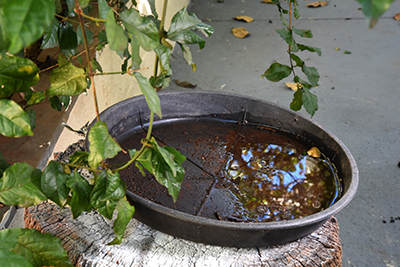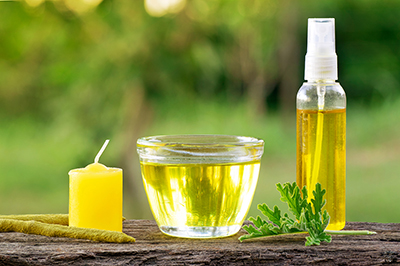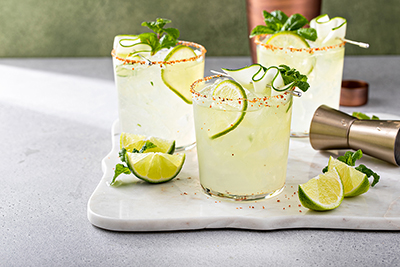Mosquitoes Crashing Your Party?
Often-unwelcome guests at backyard parties and barbecues, mosquitoes can really interrupt your summer party vibe. Here are some natural ways to help keep the mosquitoes at bay this season so you can enjoy your warm summer evenings.
 Remove Standing Water
Remove Standing Water
This is a basic one that you may have heard before. Mosquitoes lay their eggs in water. Less water means less opportunity for new mosquitoes. If you have water fixtures in your backyard—like a birdbath or water bowls for pets—change the water frequently to prevent mosquitoes from having the opportunity to lay eggs, hatch, and grow. If you have a pond in your outdoor entertainment space, try having fish in the pond that eat mosquito larvae, like mosquitofish, goldfish, guppies, or koi carp.
Plant a Native Garden
What better way to control mosquitoes than to invite some of their potentially less annoying predators like birds or dragonflies? Do some research to find out which plants are native to your area and which animals they attract. You may also be making your space a beautiful sanctuary, not only for wildlife but for yourself and your party guests as well.
Using Catnip for More Than Just Cats
Did you know that catnip essential oil can be an effective tool for repelling mosquitoes? It appears that a chemical, called nepetalactone, found in the oil acts as an irritant that repels mosquitoes as well as other insects.[i] In fact, following a study that found catnip was comparable to DEET in repelling mosquitoes, there has been more research into catnip essential oil’s mosquito-repellent properties.[ii]
 Other Essential Oils That May Be Helpful
Other Essential Oils That May Be Helpful
We talked about the potential power of catnip essential oil. Other essential oils have been researched as well for their use in helping to repel mosquitoes.
Some common examples are citronella, patchouli, and clove.[iii] These essential oils can be used in a diffuser in your party area or diluted in a spray bottle with water and applied to yourself or nearby surfaces.
Wear Protective Clothing
Plan your party outfit accordingly. Long sleeves and long pants are ideal for deterring mosquito bites, especially if you are attending an outdoor evening party. Bonus points if these can be cinched at the wrists and ankles! In warm or hot outside temperatures, opt for thermal-regulating fabrics that will keep you cool, like cotton, bamboo, linen, or silk.
Be Mindful of Nutrition and Diet
Ensuring a balanced nutrition intake is a key recommendation for overall wellbeing. Moreover, there has been significant interest and debate surrounding the correlation between nutrition and one’s susceptibility or attractiveness to mosquitoes. Vitamin B₁ or thiamine is a nutrient that has been associated with vulnerability to mosquito bites. However, the research does not seem to support its use in repelling mosquitoes.[iv] Despite this, ensuring adequate thiamine or vitamin B₁ levels is important for overall health and is still worth investigating with your naturopathic doctor.
Several foods have been traditionally used to lower the risk of mosquito bites or decrease a person’s attractiveness to mosquitoes. These include garlic, onion, vanilla, citrus fruits, lemongrass, apple cider vinegar, and chilies.[v] There is limited research on their effectiveness when it comes to mosquitoes. Whole foods, including the ones listed above, and a healthy diet are a great way to prevent nutrient deficiencies and can also go a long way in supporting your body’s immune system and resilience.
Collaborating with your naturopathic doctor or nutritionist to customize a diet based on your individual needs can contribute to overall health. Addressing nutrient deficiencies serves as a valuable approach to bolstering your immune system and enhancing your body’s resilience.
 Incorporate Nonalcoholic Beverages at Your Party
Incorporate Nonalcoholic Beverages at Your Party
Did you know that drinking alcohol may make you more attractive to mosquitoes? A study revealed that after drinking even one beer, there was an increased risk of mosquito bites.[vi] Limiting or eliminating alcohol doesn’t necessarily mean fewer fun drinks at your summer party, though. Try your hand at some herbal mocktails and botanical brews like elderflower cordial, frozen mint lemonade, or agua fresca with in-season fruits—these are some of my summer favourites.
Hopefully, this gives you some helpful ideas in managing mosquitoes at your next summer party. Have a happy, safe, and healthy summer!
 Dr. Felicia Assenza, HBSc, ND
Dr. Felicia Assenza, HBSc, ND
A Hamilton-based naturopathic doctor whose goal in every patient visit is to share the knowledge and experiences that she gained on her own journey.
drfeliciaassenzand.com
[i] Melo, N, M. Capek, O.M. Arenas, A. Afify, A. Yilmaz, C.J. Potter, P.J. Laminette, A. Para, M. Gallio, and M.C. Stensmyr. “The irritant receptor TRPA1 mediates the mosquito repellent effect of catnip.” Current Biology, Vol. 31, No. 9 (2021): 1988–1994.e5.
[ii] Bernier, U.R., K.D. Furman, D.L. Kline, S.A. Allan, and D.R. Barnard. “Comparison of contact and spatial repellency of catnip oil and N,N diethyl-3-methylbenzamide (DEET) against mosquitoes.” Journal of Medical Entomology, Vol. 42, No. 3 (2005): 306–311.
[iii] Trongtokit, Y., Y. Rongsriyam, N. Komalamisra, and C. Apiwathnasorn. “Comparative repellency of 38 essential oils against mosquito bites.” Phytotherapy Research, Vol. 19, No. 4 (2005): 303–309.
[iv] Ives, A.R., and S.M. Paskewitz. “Testing vitamin B as a home remedy against mosquitoes.” Journal of the American Mosquito Control Association, Vol. 21, No. 2 (2005): 213–217.
[v] Weger Lucarelli, J., H. Auerswald, M. Vignuzzi, P. Dussart, and E.A. Karlsson. “Taking a bite out of nutrition and arbovirus infection.” PLoS Neglected Tropical Diseases, Vol. 12, No. 3 (2018): e0006247.
[vi] Shirai, O., T. Tsuda, S. Kitagawa, K. Naitoh, T. Seki, K. Kamimura, and M. Morohashi. “Alcohol ingestion stimulates mosquito attraction.” Journal of the American Mosquito Control Association, Vol. 18, No. 2 (2002): 91–96.

 Stores
Stores